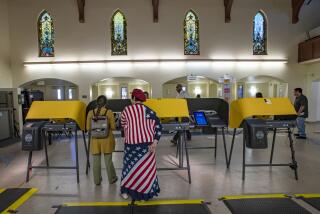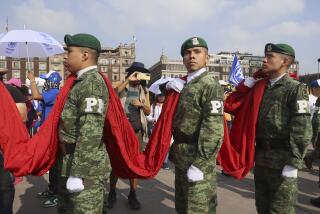Election Guards Who Paid Ultimate Price
- Share via
BAGHDAD — They were guards who were killed as they worked to protect voters in Iraq’s first democratic election in 50 years.
Abdulamir Kadim Hamad, who stopped a suicide bomber at a school in the capital’s Mansour neighborhood, and Adil Nasir Bahadli, who did the same at another polling station, have been hailed by the Iraqi government as heroes who defied insurgents seeking to thwart the U.S.-backed elections.
Increasingly, the battle for Iraq is the battle to overcome the fear that blankets much of the population. Guerrillas have pledged to punish those who cooperate with the United States or the government being set up under its auspices, and frequently have made good on their threats.
On Wednesday alone, a television reporter for a U.S.-funded Arabic station was slain; a convoy of Kurdish officials was attacked, killing one and wounding four; and a senior member of the Interior Ministry was reported abducted on his way to work.
In such a climate, government officials are eager to make heroes of people like Hamad and Bahadli who stood up to the militants. The government has named a school after Bahadli and is proposing naming streets after the two guards.
Hamad, 30, was a member of the Iraqi police who lived in the Doura section of Baghdad, one of the neighborhoods supportive of the insurgency. On election day, he was assigned to guard a polling station at the Zehra School in Mansour.
According to his family and friends, Hamad observed a man who looked like a foreigner approaching a long line of voters. Hamad thought something was wrong because the man appeared nervous.
Without waiting, he rushed the man, threw his arms around him, and pushed him away from the voters, according to several accounts of the incident. The two fell to the ground. There was a struggle, and then an explosion.
“God chose him to be immortal. God the Almighty chose him to sacrifice his life in order to save innocent people,” said Hamad’s older brother Samir. “If the attacker was able to penetrate the line, then the losses would have been enormous.”
Hamad was the suicide bomber’s only victim; his bullet-proof vest deflected much of the shrapnel. Four other police officers were wounded, but no voters were hurt. The polling station remained open.
“At the beginning, I felt very sad and started to cry,” Samir said. “But when I was told about how he died, my sadness began to change into pride and happiness, because he offered something that many people could not do. He is a martyr for his country and for Iraqi society.”
Samir recounted how three days after Hamad’s death, a car with some well-dressed men drove up to a tent that his family had set up in front of their house to receive mourners. A senior police official, who had come to pay respects, became suspicious and told the first man who alighted from the car to stop. When he refused, the official fired his weapon at him.
A gun battle erupted. The visitors turned out to be insurgents, apparently intent on taking revenge on Hamad’s family. Three men were arrested, but two other carloads of suspected insurgents escaped. Police seized a car that contained loaded rocket-propelled grenade launchers, hand grenades and other weapons.
Hamad was the fourth of eight children, and his youngest brother, Muneer, 15, said his bravery had made them famous.
“Politicians have come to see us, and so has the media. They would not do that if he had died another way,” he said.
Politicians, government officials and well-wishers have been making similar visits to Amil, the neighborhood in southwest Baghdad where Bahadli lived.
A cigarette vendor during Saddam Hussein’s rule, Bahadli, 40, recently took a job with the Federal Protective Service to support his family. On election day, he was sent to guard the Usama bin Zaid School in his neighborhood.
He knew most voters who came to cast ballots. After his wife and father-in-law voted, Bahadli noticed a stranger walking quickly to the school where voters were lining up.
Bahadli challenged the man, said his father-in-law, Kadim Hashim.
“He shouted at [the stranger] to stop and he rushed at him and knocked him down, even though the man was taller and stronger than him. They fought for several minutes,” Hashim said.
As voters watched the struggle through the school’s windows, Bahadli tried to pin the attacker’s hands to prevent him from detonating a bomb, but eventually the stranger broke free, Hashim said.
“The man’s backpack was filled with nails and ball bearings, and he finally managed to explode it,” Hashim said.
A female poll inspector was among six people killed by the blast. But Hashim said the death toll would have been higher if the bomber had succeeded in entering the packed school.
Bahadli had taken the job to raise his family, including three children, ages 10, 7, and 3. His eldest child, Murtada, said he wanted to follow in his father’s footsteps. When he grows up, he said, “I will be a guard at the same school, so that we can kill the terrorists.”
The school’s name has been changed to the Adil Nasir al Bahadli School.
Testifying to Congress four days after the election, U.S. Deputy Defense Secretary Paul D. Wolfowitz made an apparent reference to Hamad and Bahadli when he praised security forces for stopping attacks on voters.
“This seems to be, from what we can tell, two separate instances of devotion far above and beyond the call of duty,” Wolfowitz said.
More to Read
Sign up for Essential California
The most important California stories and recommendations in your inbox every morning.
You may occasionally receive promotional content from the Los Angeles Times.













